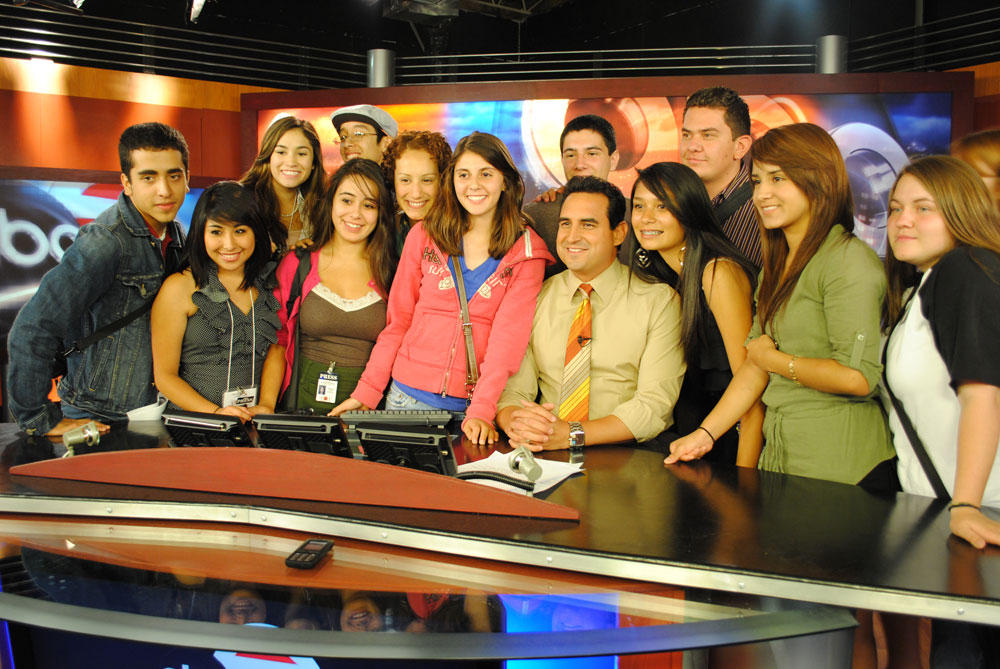EL PASO, Texas – Journalism in July is a one-week summer workshop that brought high school students and future journalists from El Paso and Ciudad Juarez to the UTEP campus to learn how to be multimedia journalists.
The workshop, which began July 9, and ended a week later, is in its eighth year and has evolved from a print media program into a multimedia program. In this transition, it has emulated what has happened in the real world of media where journalists had to develop multimedia skills to keep their work modern and more available to readers. A total of 21 students attended the workshop sponsored by UTEP and the Dow Jones Newspaper Fund. They came from the border region and included two students from Preparatoria El Chamizal in Ciudad Juarez, Mexico. Local schools included Coronado, Franklin, Hanks, Horizon, and Tornillo high schools, all of which had at least one participant in the program.
School and district rivalries were not evident in the program as students got along great from the start. “From the beginning we all clicked. We all had the same things in common and everyone was nice,” Mauricio Casillas of Franklin said.

Journalism in July participants share the set with KVIA anchor, Rick Cabrera. (Omar Perez/Borderzine.com)
The future journalists attended workshops delivered by local journalists and instructors every day during the week. They also had the opportunity of working with KTEP radio producers and KVIA-TV. “I have always wanted to be a sports anchor, and being there at Channel 7 felt great,” Casillas added.
Besides field trips and daily workshops, Journalism in July participants also worked on their own multimedia projects. Each project included a print story and either a video project or an audio slideshow package with still photos. Their final project was published as an online magazine, called Border Media.
Their stories ranged from the development of current local theater productions to controversial topics such as sexting, and the drug war violence in Juarez. Students were not afraid to talk about those touchy subjects, because they also had a goal in mind. “My story is about dating violence and how big of a serious issue it is becoming and I want to inform people about it and make them aware,” Vianni Paquian said.
The intense workshop allowed students to feel the tough aspects of journalism. Having to deal with deadlines and technical difficulties that interfered with their progress, they all had to overcome obstacles. “With this it showed me how hard and how intense the job would be, and it makes me just want to learn more,” Paquian said.
When asked if she would recommend this workshop to other students, Paquian added, “Of course I would, it is a great learning experience, hard, but in the end its worth it, and getting to show my website in my college resume.”
With struggles like losing a finished story or having to redo a slide show, students kept working hard to finish what they began. “I learned that the students are bright, funny, extremely hard working, and willing to go the extra mile to get things done; their parents should be really proud of them,” Director Nick Miller said.

Journalism in July participants, Andy Martinez, Stephanie Avalos and Sarah Skirmont surround KVIA anchor, Estela Casas. (Omar Perez/Borderzine.com)
After those minor difficulties and some stressful periods, students compensated with some fun. After working all day, students would go back to their dorms at Miner Village, to relax and interact with their fellow students. “At the dorms its fun; everyone goes to hang out; like one night we had scary stories,” Paquian said.
Journalism in July also brought two students from Juarez, giving schools other than those on this side of the border the opportunity to practice and learn multimedia journalism.
One of those students, Genaro Cruz, who is bilingual, said he is glad to have participated in the program because this type of training is not available in his school. “In my school we don’t have any journalism programs or radio station or broadcasting like here; we just have a simple communications class,” he said.
The other “Chami” student, Paola Anaya, had a much more difficult time adapting to the program because of a language barrier. She needed translations from people around her, but in the end she learned a lot, including what she calls free English classes from her peers and instructors. “Definitivamente fueron las mejores clases de ingles de mi vida y lo que he aprendido en la computadora siempre me va a servir,” she said.
Cruz’s story focused on Juarez’ soccer team, “Los Indios” and how Juarenses had found some form of entertainment and escape after the violence took over their city. Paola opted to do a story about a UTEP production of Romeo and Juliet.
After a long and hard-working week, students were encouraged to keep in touch and continue working on their website once they left Journalism in July.
“We are all talking about continuing the online magazine and writing more stories for it and hopefully keep in touch,” Amanda Ekery said.


This is a
fne story on a wonderful program. Please note the Dow Jones News Fund is proud to be a sponsor. Our new name reflects our commitment to new media and traditional journalism values.